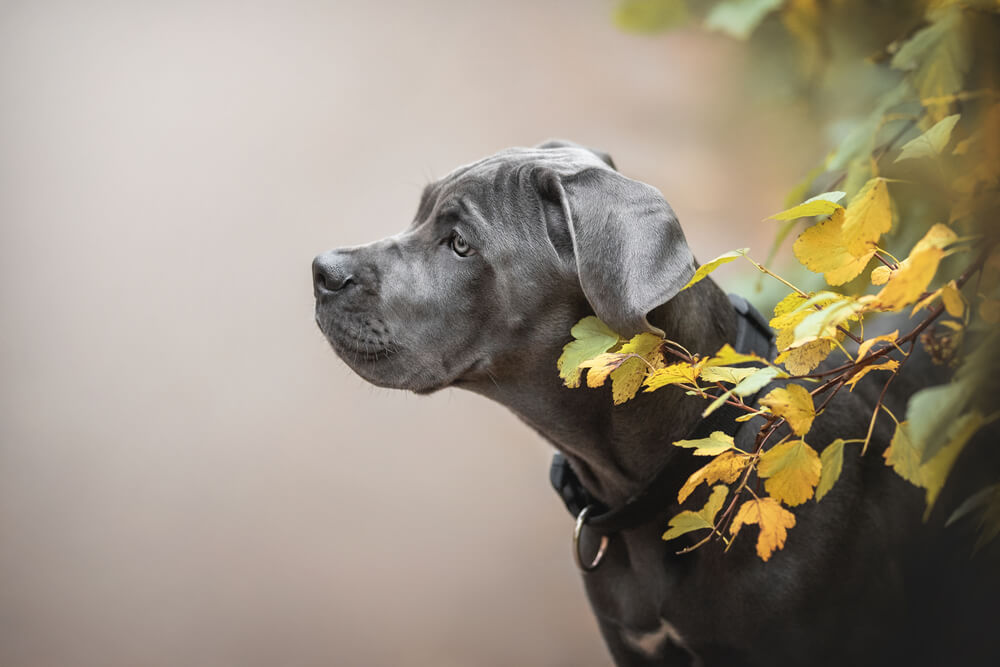Cane Corso Dog Breed: Personality, Size & More

DogFoodAdvisor is reader supported See how
All reviews are 100% impartial but if you buy using links on this page, we may earn a referral fee.
The Cane Corso, also known as King Corso or Italian Mastiff, is a large breed of dog that’s known for its intelligence, loyalty, eagerness to please, and calm and gentle temperament.
They can appear large and imposing, but due to their affectionate and friendly demeanor, Cani Corsi are easy to train and, as a result, make faithful and loving family members.
Early socialization of Cane Corso puppies is key to ensuring the breed does not dominate and cause problems with other pets or family members, and also ensuring that their high drive to guard — whether it’s resources, family members, or the home — doesn’t become an issue.
Corsi are an increasingly popular breed in the U.S. — according to the American Kennel Club (AKC), they’re currently 16th in its breed popularity rankings.
The breed’s name roughly translates from Latin as ‘bodyguard dog’, and the history of the breed goes back to Roman times. They belong to a sub-breed of working dogs called Mollosus dogs, after the Ancient Greek Molossi tribe which bred giant Mastiff-type guardian dogs. The dogs were known for their wide chest span, muscular legs and imposing stature — attributes that can equally be applied to today’s Corsi, which stem from this ancient breed, which was first recorded in 1127 AD.
The Roman legions that attacked the Greek islands and overcame the troops took the brave and fearless Mollosus breeds back to Italy and bred them with their Italian dogs, resulting in today’s Corsi ancestors. They were used as war dogs, where their fearlessness and loyalty saw them charge into battle with flaming oil strapped to their backs.
Over time, the Cane Corso became a faithful boar-hunting dog as well as a reliable farm worker, helping drive pigs and cattle and becoming well-known for its defining characteristic: guarding, specifically farm buildings and livestock.
Other characteristics of the breed include its short coat, its muscular appearance, its wide, friendly eyes, and its energetic yet kind nature.
They have a short, dense coat comprising stiff fur like a cow, meaning shedding isn’t a problem — usually, they shed just twice a year in spring and autumn. They’re also not big droolers, as they don’t have the jowls that produce non-stop drool.
The Cane Corso personality is often described as “softhearted”, “obedient” and “well-behaved”.
General Characteristics:
- Origin: Italy
- Size: Large
- Height: 25 to 28 inches at the shoulder
- Weight: 90 to 120 pounds
- Lifespan: 9 to 12 years
Appearance:
- Coat: Short, dense, stiff and water-resistant
- Colors: Black, gray, fawn or red. Brindle varieties include black, gray and chestnut.
- Build: Muscular, imposing, strong, with an alert and attentive expression
Cane Corso Temperament:
- Gentle: When properly socialized, they are gentle, caring and elegant towards their family.
- Energetic: Due to their size, the breed has stacks of energy and requires plenty of physical exercise.
- Intelligent: As a working dog, Corsi learn quickly, are obedient and thrive when given a job to do.
Training and Exercising:
- Training: Socialization and training are key when they’re young. Due to their high levels of intelligence, they learn quickly, making them easy to train.
- Exercise: Physical activity is essential, including daily walks and runs. Keeping their mind stimulated is also important — they enjoy agility and obedience training and taking part in tracking and sports such as dock diving.
Grooming:
- Shedding: Due to their short, stiff coat, Corsi shedding is kept to a minimum. Expect minimal coat shedding twice a year.
Interesting Facts:
- The breed’s name is pronounced ‘Kah-nay Corso’.
- The Cane Corso is America’s most Googled dog breed — it was searched for 1.32 million times a month in 2023, according to data by OurFitPets.
- By the 1970s, Corsi were nearly extinct as a breed, following regular invasions of Italy and Sicily, and the mechanization of farming to a point where the dogs were no longer required by farmers. A group of Italian dog fanatics located remaining examples of the breed and formed the Society of Cane Corso Lovers in 1983. Its mission was to save the breed from being wiped out. Within 10 years, the breed was being displayed in dog shows across Europe.
- The first Corsi arrived in the U.S. in 1988, and the breed was recognized by the American Kennel Club in 2010.
- As well as hunting boar throughout history, the breed was famous for hunting porcupines, which were once prized for their meat. Corsi would regularly take quills to the face in order to retrieve their prey.
- The breed has inspired work by many artists and sculptors, including Italian artists Bartolomeo Pinelli, Andrea Mantegna, Paolo Persico and Tommaso Solari.
- Movie star Rudolph Valentino owned several Corsi, which he imported from Puglia in the 1920s
Cane Corso Price:
The average cost of a Cane Corso in the U.S. varies depending on the dog’s pedigree, the breeder’s reputation, location, and whether the dog is intended for show, breeding, or as a pet. Here’s a general guide:
Show Quality or Breeding Quality Cane Corso:
Price Range: $1,500 to $5,000-plus
If buying a Cane Corso puppy or specific breeds of Corsi, the price will be towards the more expensive end of the spectrum.
Rescue or Adoption:
Adoption Fee: Around $300
A Cane Corso adopted from a rescue organization or shelter generally costs less. This fee often includes initial veterinary care and spaying/neutering.
Best Food for Cane Corso
Dr. Tim’s Weight Management Metabolite Formula
Dr. Tim’s Weight Management Metabolite Formula is ideal for Cane Corsos because it supports a healthy weight while maintaining lean muscle mass with high-quality protein and balanced fat levels. With added L-carnitine for metabolism support, glucosamine for joint health, and probiotics for digestion, it helps keep this large breed strong and active.
For more choices: See our Best Dog Food for Cane Corso page.
Final word
The Dog Food Advisor does not accept money, gifts, samples or other incentives in exchange for special consideration in preparing our reviews.
However, we do receive a referral fee from online retailers (like Chewy or Amazon) and from sellers of perishable pet food when readers click over to their websites from ours. This helps cover the cost of operation of our free blog. Thanks for your support.
For more information, please visit our Disclaimer and Disclosure page.



